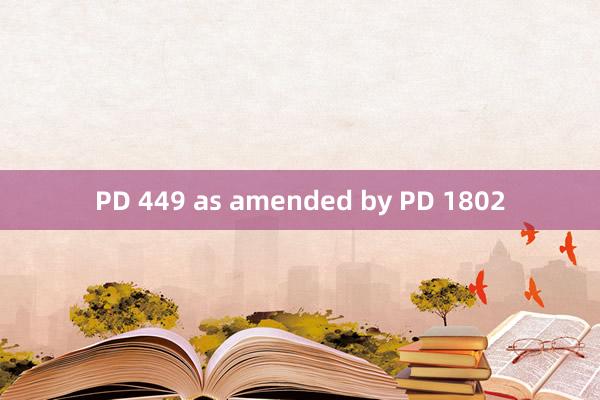PD 449 as amended by PD 1802

Understanding PD 449 as Amended by PD 1802: Key Changes and Implications
Presidential Decree (PD) 449, also known as the Cockfighting Law of 1974, has been a key piece of legislation governing the regulation of cockfighting in the Philippines. The law has laid out specific guidelines to ensure that this traditional practice, deeply ingrained in Filipino culture, is conducted within a legal and controlled framework. However, with changing times and the evolving landscape of governance, it became necessary to amend this decree to address contemporary issues. This led to the introduction of PD 1802, which brought significant updates and changes to the original law.
In this article, we will explore the core elements of PD 449 and highlight the amendments brought by PD 1802, as well as the broader implications of these changes on the cockfighting industry and its stakeholders.
Overview of PD 449
PD 449, signed into law by then-President Ferdinand Marcos, was enacted to regulate cockfighting in the Philippines. At its core, the law was aimed at providing a legal framework that would balance cultural practices with public welfare and order. Cockfighting, or "sabong," has long been a part of Filipino tradition, especially in rural areas where it remains a popular form of entertainment and social activity. However, the unregulated nature of the activity led to various issues, including illegal gambling and disorderly conduct, xxx viet nam hd which prompted the government to step in and introduce this legislation.
Under PD 449, xxxx thai lan the following key provisions were established:
-
Licensing and Regulation: The decree mandated the need for licenses to operate cockpits and to participate in cockfighting events. Local governments were given the authority to regulate the number and operation of cockpits in their jurisdictions.
-
Controlled Scheduling: Cockfighting events were only allowed on Sundays,phim sex việt nam địt nhau cực mạnh legal holidays, and during local fiestas, ensuring that the practice would not interfere with the daily lives of citizens and other community activities.
-
Penalties for Illegal Cockfighting: The law outlined penalties for unauthorized cockfighting activities, aiming to reduce the occurrence of illegal gambling and disorderly gatherings.
-
Animal Welfare: Although the decree primarily focused on the regulation of cockfighting events, it also laid down guidelines to ensure the humane treatment of the animals involved.
While PD 449 addressed the primary concerns at the time of its enactment, the subsequent years saw changes in the socio-political landscape that necessitated further revisions to the law. This led to the introduction of PD 1802.
Key Amendments Introduced by PD 1802
PD 1802 was introduced to amend certain provisions of PD 449 to better reflect the modern-day realities of cockfighting regulation. Some of the key changes brought about by PD 1802 include:
-
go88 play
-
Expanded Licensing Requirements: PD 1802 broadened the scope of licensing regulations. Under the amended law, stricter licensing procedures were put in place, with increased oversight from local government units (LGUs) and the national government. This ensures that cockfighting operators comply with updated safety, security, and public welfare standards.
-
Modernized Cockpit Facilities: One of the significant amendments was the requirement for cockpit arenas to adhere to modern standards. This includes provisions for better facilities, ensuring safety and comfort for both participants and spectators. PD 1802 also set guidelines for the appropriate ventilation, seating capacity, and emergency measures in cockpit arenas, aiming to modernize the infrastructure where cockfighting events are held.
-
Stricter Enforcement of Animal Welfare Provisions: PD 1802 placed a stronger emphasis on the humane treatment of animals used in cockfighting. It introduced stricter penalties for the maltreatment of animals and required operators to ensure that the birds are cared for in accordance with updated welfare standards.
-
Digital and Online Cockfighting: With the rise of digital technologies and online platforms, PD 1802 introduced provisions that address the growing trend of online cockfighting. The amended law recognizes the popularity of "e-sabong" and sets guidelines for its regulation, ensuring that these digital arenas adhere to the same licensing and operational standards as physical cockpits. This amendment was essential in addressing the risks associated with illegal online gambling and ensuring that revenues from e-sabong are properly regulated.
-
Revenue Generation and Taxation: Another important aspect of PD 1802 is its emphasis on revenue generation for the government. The amended law includes provisions for the collection of taxes and fees from both traditional cockfighting and e-sabong, ensuring that a portion of the earnings is funneled back into the national and local economies. This change reflects the government’s intent to not only regulate but also benefit from the revenues generated by the cockfighting industry.
Broader Implications of the Amendments
The amendments brought by PD 1802 have significant implications for various stakeholders involved in the cockfighting industry. For operators and participants, the law provides a more structured and secure environment in which to conduct cockfighting events. With the introduction of stricter regulations and modernized facilities, the industry is expected to attract a wider audience, including those who may have previously shied away due to safety and welfare concerns.
For the government, PD 1802 presents an opportunity to tap into a new revenue stream through the regulation of e-sabong and other cockfighting-related activities. The law also aligns with broader efforts to curb illegal gambling, ensuring that cockfighting is conducted within the confines of the law.
Finally, the amendments signal a shift toward a more ethical treatment of animals involved in the practice. By placing a greater emphasis on animal welfare, the law acknowledges the need to balance cultural traditions with modern standards of humane treatment.
Conclusion
PD 449, as amended by PD 1802, represents a comprehensive approach to regulating cockfighting in the Philippines. While honoring the cultural significance of sabong, the amendments address the evolving nature of the industry and the need for stricter regulations, modernized infrastructure, and ethical considerations. As the industry continues to evolve, these changes ensure that cockfighting remains a regulated, safe, and economically beneficial activity for the country.
LOVEJILI com login registerwww.ciudadweston.com





